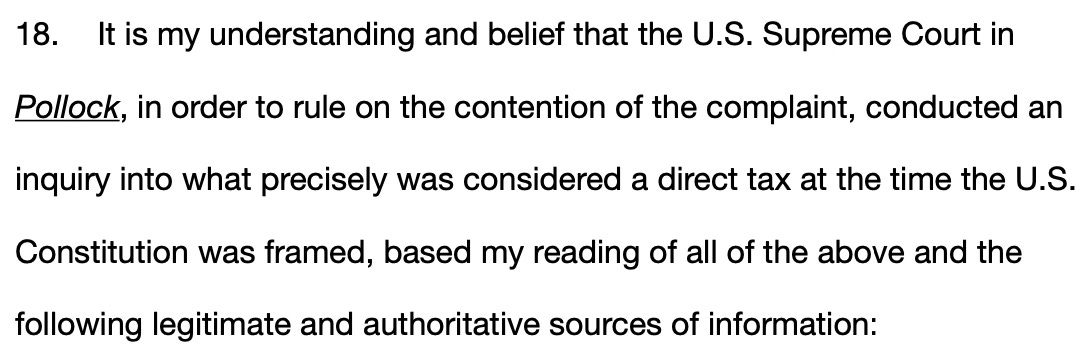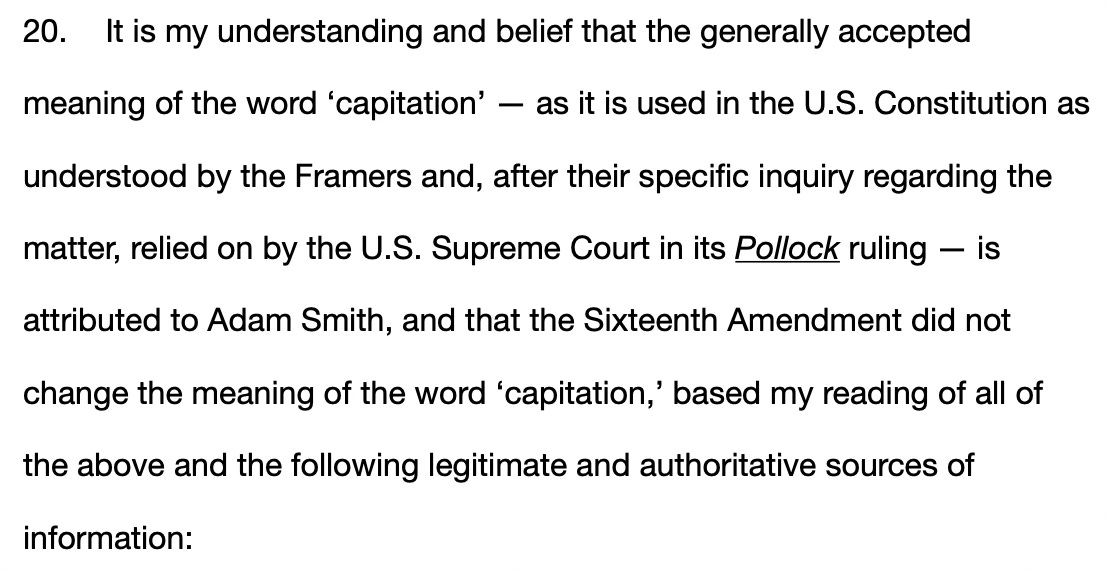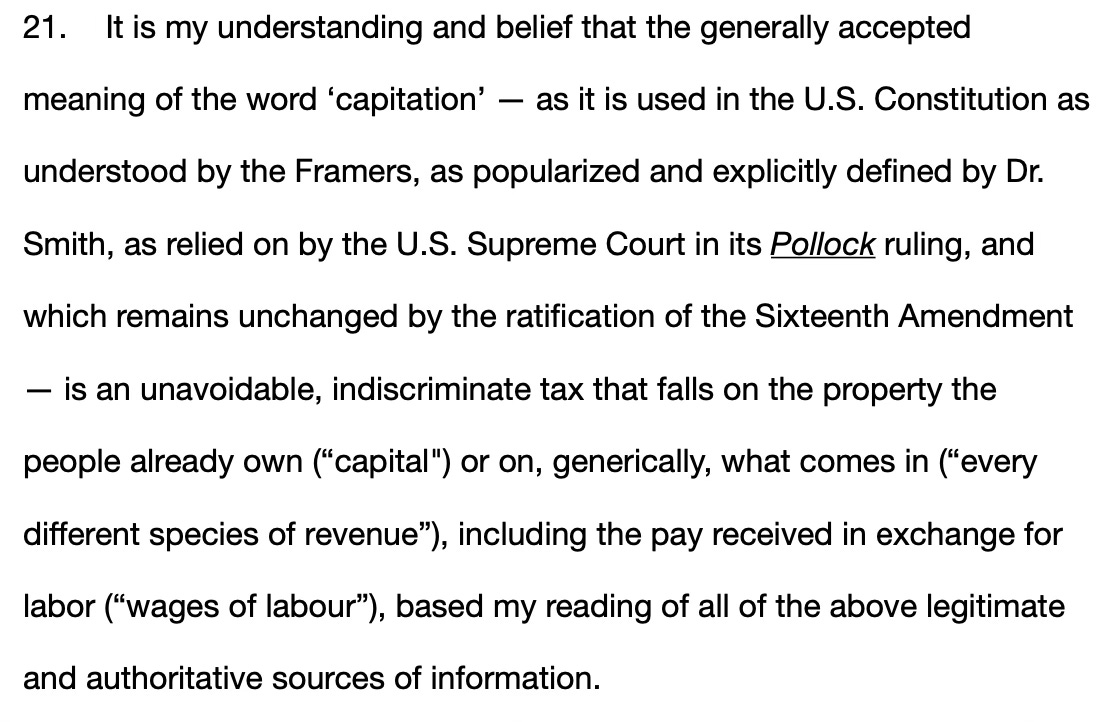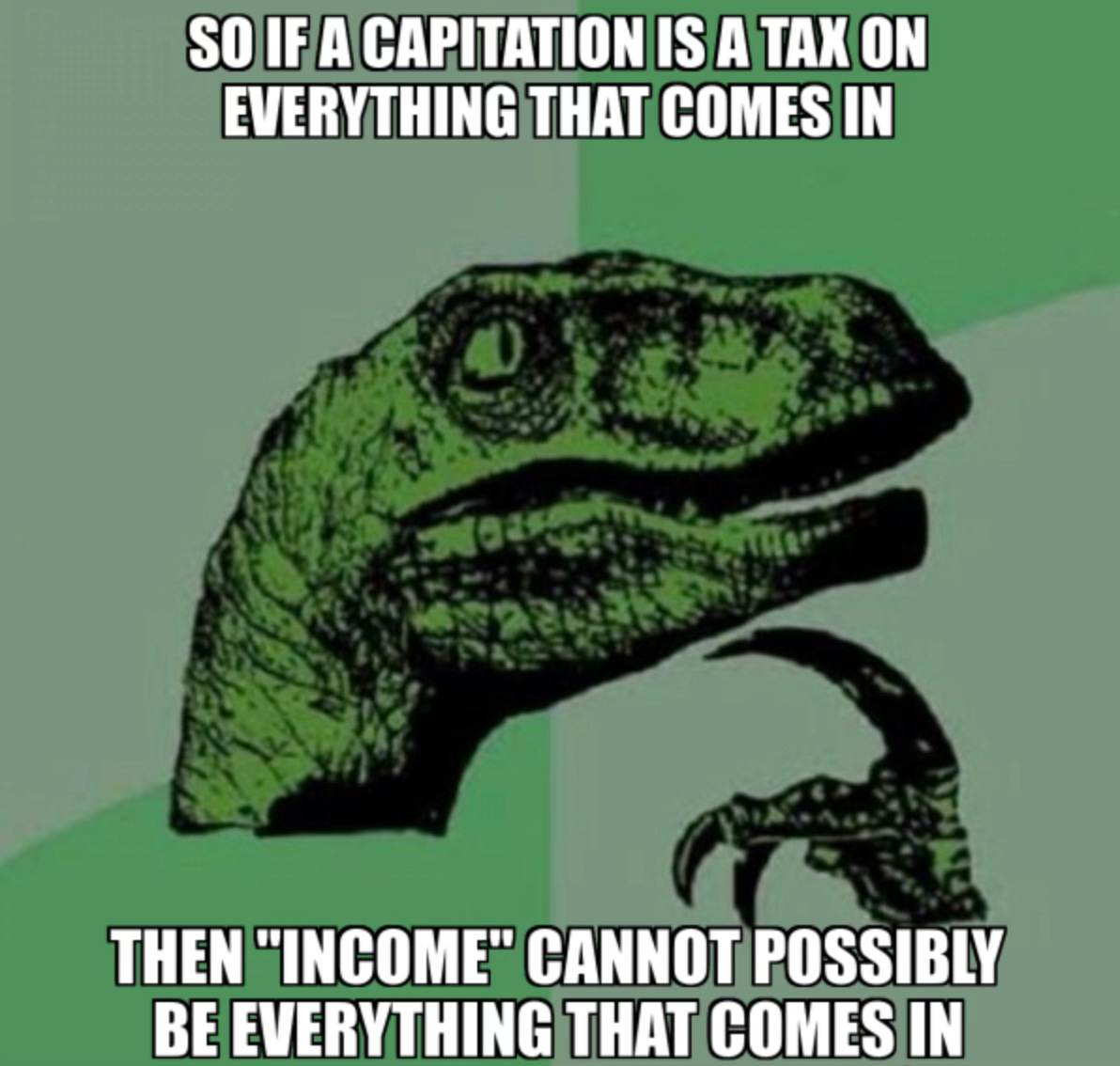what did the framers of the u.s. constitution mean exactly when they wrote the words “Capitation, or other direct, Tax” in article I, section 9, clause 4?
if we understand precisely what the framers meant by “Capitation, or other direct, Tax,” would that not inform us what cannot be taxed as “income?”
well, in 1895 the u.s. supreme curt conducted an inquiry into the meaning of capitation or other direct tax for the pollock case:
See Pollock v. Farmers' Loan & Trust Co., 157 U.S. 429 (1895)
The contention of the complainant is: First. That the law in question, in imposing a tax on the income or rents of real estate, imposes a tax upon the real estate itself; and in imposing a tax on the interest or other income of bonds or other personal property, held for the purposes of income or ordinarily yielding income, imposes a tax upon the personal estate itself; that such tax is a direct tax, and void because imposed without regard to the rule of apportionment; and that by reason thereof the whole law is invalidated.
and
We inquire, therefore, what, at the time the constitution was framed and adopted, were recognized as direct taxes? What did those who framed and adopted it understand the terms to designate and include?
See Moore v. United States, 602 U.S. ___ (2024)
Direct taxes also include a capitation tax, which imposes a tax on every person “without regard to property, profession, or any other circumstance.” National Federation of Independent Business v. Sebelius, 567 U. S. 519, 571 (2012) (NFIB) (internal quotation marks omitted; emphasis deleted).
and
… the Constitution requires that direct taxes be apportioned among the States [in 2024 the U.S. Supreme Court is using the present tense “requires” so we can tell it is still the case post 16th amendment].
See U.S. Constitution, Article I, Section 9, Clause 4
No Capitation, or other direct, Tax shall be laid, unless in Proportion to the Census or enumeration herein before directed to be taken.
See Pollock v. Farmers' Loan & Trust Co., 157 U.S. 429 (1895)
Mr. Justice Paterson said that 'the constitution declares that a capitation tax is a direct tax;
and
The requirement of the constitution is that no direct tax shall be laid otherwise than by apportionment.
See Pollock v. Farmers' Loan & Trust Co., 157 U.S. 429 (1895)
But Albert Gallatin [who, according to Wikipedia, was the longest serving U.S. Secretary of the Treasury], in his Sketch of the Finances of the United States, published in November, 1796, said: 'The most generally received opinion [this means most people at the time believed this to be true], however, is that, by direct taxes in the constitution [that what was considered to be a direct tax at the time the U.S. Constitution was framed], those are meant which are raised on the capital [are taxes on “the property the people already owned”] or revenue of the people [or taxes on, generically, “what comes in”]; by indirect, such as are raised on their expense.
and
As that opinion is in itself rational [that specific meaning of direct taxes — taxes on “the property the people already owned” or taxes on, generically, “what comes in” — that was intended by the Framers and was what most people believed at the time, is entirely rational and logical], and conformable to the decision which has taken place on the subject of the carriage tax [and that logical, rational, most generally received opinion does not contradict the decision in the Hylton case], and as it appears important [(!)], for the sake of preventing future controversies [(!)], which may be not more fatal to the revenue than to the tranquillity of the Union[(!!)], that a fixed interpretation should be generally adopted [because a logical, fixed, specific meaning of direct taxes is important to prevent future controversy and preserve tranquility], it will not be improper to corroborate it by quoting the author from whom the idea seems to have been borrowed [it makes sense to confirm that the above, logical, rational, most generally received opinion of the meaning of direct taxes is corroborated using the source from which the very idea was borrowed].’
and
He then quotes from Smith's Wealth of Nations [the magnum opus], and continues: 'The remarkable coincidence [(!)] of the clause of the constitution with this passage in using the word 'capitation' as a generic expression, including the different species of direct taxes [the same word ‘capitation’ is used in both Smith’s magnum opus with a specific meaning and in the direct tax clause of the Constitution as a generic expression], an acceptation of the word peculiar, it is believed, to Dr. Smith [and the generally accepted meaning of the word ‘capitation’ was popularized by Smith], leaves little doubt that the framers of the one had the other in view at the time, and that they, as well as he, by direct taxes [the word ‘capitation’ as it is used in the Constitution as a general expression must have been intended to have the same meaning as what Dr. Smith popularized], meant those paid directly from and falling immediately on the revenue [meaning that a tax levied directly on “what comes in” is the Framer’s intended definition of a direct tax]; and by indirect, those which are paid indirectly out of the revenue by falling immediately upon the expense.' 3 Gall. Writings (Adams' Ed.) 74, 75.
See ‘An Inquiry into the Nature and Causes of the Wealth of Nations’ Book V, Chapter II, Adam Smith (1776)
The taxes which, it is intended, should fall indifferently [or indiscriminately] upon every different species of revenue [meaning all of the different forms of “what comes in”], are capitation taxes …
and
Capitation taxes, so far as they are levied upon the lower ranks of people, are direct taxes upon the wages of labour [this is the common meaning of the word “wages,” and obviously not the specifically defined term that is in the I.R.C.; this word is being used here as a generic way to say the pay received in exchange for labor; therefore, capitations are direct taxes on the pay received in exchange for labor], and are attended with all the inconveniences of such taxes …
hopefully this is becoming clear to you:
» by direct taxes in the constitution those are meant which are raised on the capital or revenue of the people «
so, no, it is not only property taxes that are direct taxes. that category also includes taxes on everything that comes in.
the “remarkable coincidence of the clause of the constitution [“Capitation, or other direct, Tax” in article I, section 9, clause 4] with this passage [from Smith's Wealth of Nations] in using the word 'capitation' as a generic expression, including the different species of direct taxes … leaves little doubt that the framers of the one [the constitution] had the other [Smith's Wealth of Nations] in view at the time” means that the framers and adam smith were all using the word ‘capitation’ to mean the exact same thing.
and adam smith makes it perfectly clear that, “the taxes which, it is intended, should fall indifferently upon every different species of revenue [meaning all of the different forms of “what comes in”], are capitation taxes,” which, “so far as they are levied upon the lower ranks of people, are direct taxes upon the wages of labour.”
there you have it. working for a living does not necessarily generate “income”.
the only undisputed facts in my tax court case are that i worked and i was paid.
but as i am merely one of the “lower ranks of people,” an indiscriminate tax on the payment i received for my work, “without regard to [my] property, [my] profession*, or any other circumstance” is, as the framers intended …
THE DEFINITION OF A DIRECT TAX
everyone with me so far?
this means that there has been a deliberate effort over the past century to obscure our language. we have been trained to casually use the word ‘income’ to mean everything that comes in so that we do not question whether we actually owe a tax on everything that comes in.
but the income tax is not a capitation. it is not a direct tax. it is unequivocally in the not-direct category.
which means that the “income” that is subject to the income tax, must be a distinct subset of everything that comes in.
so how do we differentiate between the generic “everything that comes in” that would only be subject to a capitation, or direct tax, and the subset of what comes in that is, in fact, “income” and subject to a not-direct tax?
stay tuned.
*please note, that my work as an enrolled actuary [§7701(a)(35)], would be with “regard to … [my] profession,” but as i testified in court, i had not been acting as a pension plan’s enrolled actuary since 2016, and so did not apply to the work i did for the tax year in dispute, 2020.










